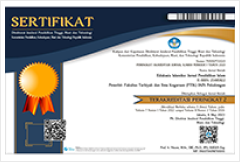Quality Management of Teacher Empowerment in Pekalongan Primary Islamic Schools
DOI:
https://doi.org/10.28918/jei.v7i2.6275Keywords:
quality management, Islamic school’s character building, teacher empowermentAbstract
A school's quality is heavily determined by the competence of its teachers. In terms of Islamic schools where building Islamic character in students serves as the main objective, the teachers play even a greater role. This article discusses concepts related to the empowerment of Islamic primary schools in Pekalongan. Promoting quality services to the community, the schools develop a strategy to empower their teachers. The research uses multiple case study whereby a variable-oriented approach is employed to develop a number of propositions upon which a cross-case analysis is constructed. This research article discusses theories related to human resource management, builds interconnection between the theories and the concept of teacher empowerment, and finally analyzes some profound findings upon which the schools are considered successful in empowering their teachers. It underscores the role of -amongst which- a teachers forum in improving the teaching and learning quality in the schools
References
Abbas Sani Dahiru, Kayode O. Gbolahan, “Mediating role of teacher empowerment on the relationship between instructional leadership and school effectiveness”, International Journal of Academic Research in Business and Social Sciences, 2022, 12(2), 514-528.
Ali, Abbas J. “Islamic challenges to HR in modern organizations”. Personnel Review.
no.6 (2010) 692-711.
Almutawa, Zeyad. Nuttawuth Muenjohn dan Jiaying Zhang. “The effect of the human resource management system on employees’ commitment.” The Journal of Developing Areas. 50. no.6 (2016) 19- 27.
Bhatti, Omar K. Uzma S Aslam. Arif Hassan. Mohamed Sulaiman. “Employee motivation an Islamic perspective.” Humanomics. 32. no.1 (2016) 33-47.
Bogler, Ronit & A.E. Nir. “The importance of teachers’ perceived organizational support to job satisfaction: What’s empowerment got to do with it?.” Journal of Educational Administration. 50. no. 3 (2012): 287-306.
Bogler, Ronit dan Anit Somech. “Influence of teacher empowerment on teachers’ organizational commitment, professional commitment and organizational citizenship behavior in schools.” Teaching and Teacher Education. 20. (2004) 277-289.
Bonjean, Charles M. NEW PATTERNS OF MANAGEMENT. By Rensis Likert. New York: McGraw-Hill Book Company. 1961. 279. Social Forces. 42. no 2 (December 1963) 261. https://doi.org/10.1093/sf/42.2.260.
Botha, Basil. “Total Quality Management and Teacher Empowerment'', (Mini-Disertasi, Rand Afrikans University, 1996).
Chairunnisa, Connie. “Pemberdayaan guru melalui pelatihan penulisan karya ilmiah di sekolah menengah kejuruan.” Faktor Jurnal Ilmiah Kependidikan. 3. No. 2 (Juli 2016): 105-114 .
Chowdhury, Abdul Hamid. Nazamul Hoque dan Mohammad Masrurul Mawla, “Human Resource Management from Islamic Perspective”, Bangladesh Journal of Islamic Thought, 7, no. 10 (2019).
Conger, Jay A. dan Rabindra N. Kanungo, “The Empowerment Process: Integrating Theory and Practice”, The Academi of Management Review, 13, no.3 (Juli, 1988) 471-482.
Dahlgaard, Jens J.. Kai Kristensen. Gopal K.Kanji. “Fundamentals of Total Quality Management.” Process analysis and improvement. (London. Taylor & Francis. 1998).
Daily. B. & Bishop. J.W.. “TQM Workforce Factors And Employee Involvement: The Pivotal Role of Teamwork.” Journal of Managerial Issues. 15. No.4. (2003) 393- 412.
Desi Sianipar, Johanes Waldes Hasugian, Wellem Sairwona, Yunardi Kristian Zega, Nova Ritonga, “Classroom Management of Christian Religious Education During the Covid-19 Pandemic”, Budapest International Research and Critics Institute-Journal, 2021, 4(4), p. 7585-7596.
Forefry, Nasyith. “Strategi pemberdayaan guru oleh sekolah: studi kasus di SMAN 5 dan SMA Darul Hikam Kota Bandung.” Jurnal Administrasi Pendidikan. 24. No.1 (April 2017) 47-59 .
Goyal, Charu dan Manoj Patwardhan. “Identification of factors of Hard and Soft Human Resource Management Practices.” Journal of Information Technology Applications & Management. 27. no.6 (Desember. 2020) 75-78.
Grote. James R. ``An analysis of the relationship between administrators’ perceptions of management style as determined by the Likert System and the instituional practice of adult and continuing education in institutions of higher education”. (Doctoral dissertation. Kansas State University. 1980).
Hales., Colin. “Management and Empowerment Programmes.” Work, Employment & Society. 14. no.3 (2000) 501-519.
Hammond, Helen Georgiana. “Correlating Teacher Empowerment and Self-Efficacy to Teacher Perceptions of Principal Servant Leadership.”( Disertasi. Grand Canyon University. 2017).
Hill, Andrew Taylor Frances “Quality Management in Education.” Quality Assurance in Education. 1. no. 1 (1993) 21-28.
Huq, Rozana. “An Investigation of what employee empowerment means in theory and in practice.” Journal of Teaching and Education. 5. no.2 (2016) 551-556.
Kamaruddin Djailani AR dan Murniati AR. “Efektivitas Pemberdayaan Guru Sekolah Unggul Di Kota Sabang”. Jurnal Administrasi Pendidikan Pascasarjana Universitas Syiah Kuala. 2. No. 1. (Agustus 2014). 97-105.
Khumaedi, Muhammad. “Pemberdayaan profesionalisme guru sekolah menengah kejuruan dalam analisis statistik penelitian eksperimen”. Jurnal Pendidikan Teknik Mesin. 17. No. 1. (Juni 2017) 32-37.
Legge, Karen. Human Resource Management: Rhetorics and Realities. (McMillan Education. 1995).
Liu, Jing.. The influence of teacher empowerment on teacher intention to leave: an exploration analysis. (Disertasi. The Pennsylvania State University. 2019).
Long, Ralph F. “Empowerment-a management style for the millenium?” Empowerment in Organizations. 4. no.3 (1996).
Lunenburg, Fred C. “Total Quality Management Applied to Schools.” Schooling. 1. no.1 (2010) 1-6.
Matlhape, MG dan N Lessing. “Employees in Total Quality Management.” Acta Commercil. 2 (2002). 21-34.
Mustafa, Esam M.A. dan Abdul Talib Bon. “Role of Employee Empowerment in Organization Performance: A review.” Research Journal of Social Science & Management. 2. no.6 (Oktober. 2012) 79-83.
Ozturk et. al.. A different view of quality and total quality management. Journal of Business. vol.1 (2). (2012) 9-14.
Paul, Cathy L. “The Relationship between the Principles of Total Quality Management and School Climate, School Culture, and Teacher Empowerment”, (Disertasi, University of Missouri Columbia, 1998).
Quebodeaux, Pamela Stacey. “Quality in Education in theh Calcasieu Parish School System.” (Dissertation. (University of New Orleans. 2010).
Sallis, Edward. Total Quality Management in Education. 3rd ed.. (London. Kogan Page.
.
Seyedali Ahrari, Samsilah Roslan, Zeinab Zaremohzzabieh, Roziah Mohd Rasdi, Asnarulkhadi Abu Samah, “Relationship between teacher empowerment and job satisfaction: A Meta-Analytic path analysis”, Cogent Education, 2021, 8(1), p. 1-23.
Short, Paula M. “School empowerment through self-managing teams: Leader behavior in developing self-managing work groups in schools.” Research-report. 1993. Hal.3.
Short, Paula M. James S Rinehart. Teacher Empowerment and School Climate. Paper presented at the Annual Meeting of the American Educational Research Association (SanFrancisco. CA. April 20-24. 1992).
Singh, Manjari dan Anita Sarkar. “Dimensions. Outcomes and Mediating Roles of Empowerment.” Management and Labour Studies. 38. no.4 (2013) 315-333.
Singh, Manjari dan Anita Sarkar. “Role of psychological empowerment in the relationship between structural empowerment and innovative behavior.” Management Research Review.
Spreitzer, Gretchen M. “Psychological Empowerment in the Workplace: Dimensions, Measurement, and Validation”, The Academy of Management Journal, 38, no. 5 (Oktober, 1995), 1442- 1465.
Tindowen, Darin Jan. “Influence of empowerment on teachers’ organizational behaviors.” European Journal of Educational Research. 8. no.2 (2019) 617-631.
Victorynie, Irnie. “Pemberdayaan Guru Dalam Mendukung Pengambilan Keputusan Kepala Sekolah Dasar.” PEDAGOGIK. 3. No. 1 (2015) 89-101.
Zembylas, Michalinos & Elena C. Papanastasiou. “Modeling teacher empowerment: The role of job satisfaction.” Educational Research and Evaluation: An International Journal on Theory and Practice. 11. no. 5. (2005): 433-459.
Zulkipli Lessy & Mamud Arif, “Empowerment in Islamic Schools in Yogyakarta and Sydney , Journal of International and Comparative Education, 2020, 9(1), p.15 - 27.






















